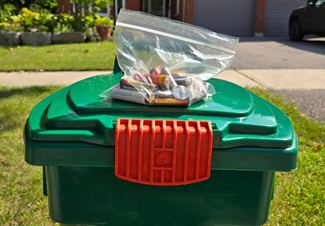Batteries not included: keep your battery stash out of the trash

Picture this: at the end of your day, you settle in to watch TV, only to find out your remote’s batteries are dead. You pop them out and start searching for replacements. But what to do with the dead batteries? The garbage might seem like the easiest option.
But wait! Batteries aren’t garbage! And tossing them in the trash is harmful not only for the environment, but for human health. Batteries contain heavy metals and corrosive chemicals like mercury, lead, cadmium, nickel and lithium. These toxic materials can leach into the soil and groundwater, contaminating our water and harming wildlife. Not only that, but certain batteries can ignite or explode in collection vehicles or in processing facilities, which puts workers, equipment and neighbouring property at risk.
So, now what? Well, it’s time to recycle those batteries – free of charge!
Batteries can be recycled forever. Unlike many materials that degrade each time they’re recycled, like paper or plastic, metals in batteries don’t wear out. In fact, as long as we keep recycling them, a single battery could keep powering new devices for centuries!
When it comes to battery recycling, nothing is landfilled. Collected batteries are sent to a processing facility where a mechanical process separates all the components of a battery for recycling. One hundred per cent of the minerals, zinc, manganese and potassium, is recovered and used as a premium micro-nutrient to grow corn. The steel and nickel from alkaline batteries is recovered and sold back into the market to produce new metals. Even the non-recyclable paper and plastic from the battery is sent to an Energy from Waste (EFW) facility that converts it into electricity, offsetting the amount of electricity used in the battery recycling process at the facilities.
How can you take part in battery collection?
One easy way to recycle your batteries is to take advantage of our curbside battery collection program. Curbside collection is held twice annually, once in the spring and once in the fall on dedicated collection weeks. Residents can place used or unwanted batteries in a clear zipper style bag and put it on top of the green bin on their battery recycling day.
Another option you can choose throughout the year is to find a battery collection box at nearly 15,000 Recycle Your Batteries, Canada! drop-off locations. It’s as easy as visiting RecycleYourBatteries.ca, entering your postal code and finding the nearest retail drop-off location. Alternatively, household batteries can be dropped off at one of the Region’s Waste Management Facilities year-round, free of charge.
“Our residents’ ongoing participation in our battery recycling program is what makes this program so successful,” says Andrew Evans, Director of Waste Management Services for the Region. “Educating residents about recycling batteries is one of the most effective ways to protect the environment, save resources and keep our community safe. When residents know where to recycle batteries and why it matters, they’re more likely to make it a routine part of their household waste management.”
Since our first curbside battery collection in November 2012, Durham Region has diverted more than 492 tonnes (1,102,013 pounds) of household batteries from the waste stream. It has also served as a catalyst for curbside battery recycling throughout Ontario with over 60 municipalities starting their own program. Durham Region is proud to have pioneered this successful diversion initiative.

But let’s not forget, safety is still important when recycling our batteries.
Here are some important safety reminders:
- Never throw batteries in the garbage or Blue Box.
- Lithium batteries can be crushed in garbage trucks and cause fires.
- Batteries can overheat if left outdoors.
- Store batteries in a plastic or cardboard box container, not metal (metal can conduct electricity).
- Store batteries in a cool dry place. Keep away from heat, sunlight and moisture. High temperatures can cause batteries (especially lithium-ion) to swell, leak or ignite.
- Damaged lithium batteries require special handling. Do not touch leaking or swollen batteries. Isolate in a plastic or cardboard box with sand or kitty litter and drop off at one of the Region’s Waste Management Facilities.
- Keep batteries out of reach of young children.
- Tape the terminals. For lithium, 9-volt and other batteries with exposed terminals, cover both ends with non-conductive tape (like electrical or duct tape). This prevents short circuits and fires during storage or transport.
- Don’t mix alkaline, lithium, NiMH and lead-acid batteries in one bag or container. Different chemistries can react with each other or cause overheating.
- Handle leaking batteries carefully. Wear gloves and eye protection if you see corrosion or white powder. Place the battery in a plastic bag and take it to a household hazardous waste facility.
We appreciate you recycling your batteries safely. To learn more about battery collection, visit durham.ca/Battery.
Contact Us




